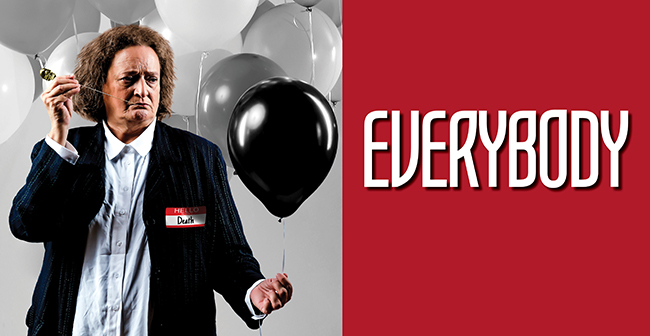Culture
 Photo: Tony Powell
Photo: Tony Powell
Everybody Promotes Inclusivity + Explores the Impermanence of the Human Condition
August 30, 2019 @ 12:00am
What would it look like to put our baggage onstage, in the role of Stuff? Or our regrets, in the role of All the Shitty Things One Has Ever Done in Their Life? Playwright Branden Jacobs-Jenkins puts these weighty emotions into physical form along with the elements of Time and Love and Death, among others, in Everybody. The production comes to Shakespeare Theatre Company (STC)’s Lansburgh Theatre from October 15 to November 17 under the direction of Will Davis in the most original of ways. Each night, six of the nine roles will be assigned to actors onstage as part of a bingo-style lottery. At the center of this comedy about death is the Hero, picked at random each night to embark on a journey where he or she prepares to die. Heavy in subject matter but light in thematic style, Davis walked me through what drew him to this play, why it’s so important to connect with audiences and how diversity in casting is multifaceted.
On Tap: How does it feel to be directing the first production of the season at STC, as well as the first production under new artistic director Simon Godwin’s leadership?
Will Davis: It’s such a privilege, honestly. It means a lot to me to be entrusted with Simon’s first season opener and I have really enjoyed the time that I’ve had to speak with him so far. He’s so obviously a leader and a director who’s interested in creating space for other artists, which I think is the number one thing you want in an artistic leader.
OT: Have you ever directed anything like Everybody before where a different role is assigned to a small cast of actors onstage each night?
WD: I’ve never directed anything that has this particular lottery concept in it but I have definitely made it a focal point [to direct pieces that are] really ambitious for the theatre to accomplish. [One] of the things I’m looking for in a play is some element of the impossible involved. In this case, [the] little piece of impossibility is there’s actually no way for me to rehearse each actor doing every possible combination of roles that they could perform. [I have to] think about, “How do I rehearse this? How do I create the right container for this play to really succeed knowing that to a certain extent, chance is built into the concept of the play?”
OT: What was your role in the casting process? How important was it to cast a diverse range of actors for this production?
WD: I’m definitely interested in making sure that the cast is racially diverse and also that the gender presentation of the folks cast is diverse as well. I’m a trans person so part of what is exciting for me is giving audiences an opportunity to think about gender parity a little bit bigger than this binary idea of men and women. [Instead], to think about gender being a more holistic thing [and] far more about the gray areas than one thing or another. The other thing I think about when casting is age. This play has a really beautifully open casting template. You’re looking for someone who is going to play Time and Love and Death and God. Just saying, “Which person’s energy best feels like it represents the concept of love?” leaves it far more open. It’s a far more exciting casting process.
OT: What feelings do you hope to evoke from the audience?
WD: What I’ve been trying to say is, there’s a dark comedy irony to it that I think leaves you feeling a sense of comradery. The audience should have a real sense of kinship with everyone else who’s in the theater with them on that given night and of course, one of the reasons they have that feeling is because the show they see will be unique. No one else who sees the show the day before or the day after will see the same show. It’s such a smart, smart thing that the playwright’s done in writing this play that’s a meditation on impermanence and humanity, [and] every night that an audience comes to see it will be its own impermanent moment.
OT: In the time I’ve been covering local theatre, STC has done a fantastic job not only of being inclusive and diverse in its casting but also in expanding the identity of gender and exploring those gray areas you mentioned earlier.
WD: I love that you say that. The thing that occurs to me is the exploration of that gray area or areas. Every single one of us lives there. There isn’t actually any person that you or I know that is definitively male or definitively female. We’re all a loose collection of traits and identities that makes sense to us. I think the more we see that onstage, the more we [can] embrace that in ourselves and our families and our children. And the other thing about Shakespeare that I always find so funny is when I read Shakespeare, all I can think to myself is, “My God, this material is so punk rock.” There’s so much space inside of Shakespeare for an openness about people’s humanity and I think it’s a great place for us to be able to show each other that. It’s a space where a lot of the conversations we’re having as a culture can really be explored and cherished.
OT: What makes Everybody relatable to millennial audiences?
WD: The way the playwright writes is that he takes things that feel old, discarded or not relevant and pulls them through a modern framework and creates this whole other world. He, in his own way, is a really punk rock writer. I also think speaking from my part of the circle, I’m trying to create an experience that will be really deeply affecting but also have a festival atmosphere. The whole design of the play is based around balloons. There’s a dance break in the middle of the show where the full cast is going to be performing with some very, very large balloon sculptures. I spend a lot of time thinking about, “What are the ways to tie these larger theatrical gestures to something that feels really meaningful and emotional?” I think that’s what we need to do onstage is really pay attention to the fact that it’s a live form and people who show up as an audience need to be respected and cherished for the fact that they are alive and in the room.
Experience a completely unique performance of Everybody between October 15 to November 17 at STC’s Lansburgh Theatre. Young Prose Night is Friday, October 18 at 8 p.m. Tickets start at $49. Learn more at www.shakespearetheatre.org.
Shakespeare Theatre Company’s Lansburgh Theatre: 450 7th St. NW, DC 202-547-1122; www.shakespearetheatre.org







